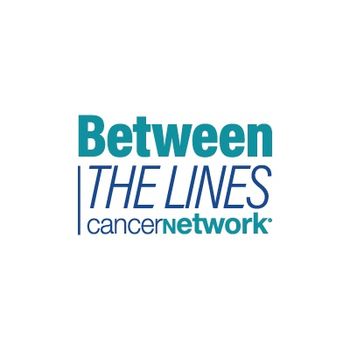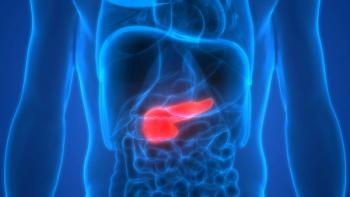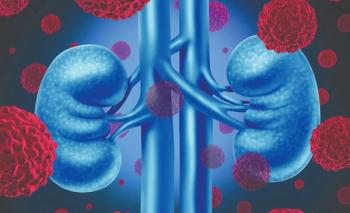
Laura Bucher-Bailey, PharmD, discussed the approval of tisotumab vedotin-tftv for patients with recurrent or metastatic cervical cancer who have had progression after chemotherapy.

Your AI-Trained Oncology Knowledge Connection!


Laura Bucher-Bailey, PharmD, discussed the approval of tisotumab vedotin-tftv for patients with recurrent or metastatic cervical cancer who have had progression after chemotherapy.

James R. Berenson, MD, discussed adverse effects associated with oral ruxolitinib plus selinexor in patients with multiple myeloma.

Phase 3 EV-302 results supported the approval, showing a statically significant survival benefit compared with chemotherapy in urothelial carcinoma.

Updated findings from the CARES-310 trial support the resubmitted application for camrelizumab/rivoceranib in unresectable hepatocellular carcinoma.

The approval is based on results from the global phase 3 FRESCO-2 trial, which demonstrated improvement in OS in patients with refractory metastatic colorectal cancer.

Carl He, MD, explores the barriers to adherence to treatment recommendations offered by the multidisciplinary team meeting in cancer care.

The act of asking for help is critical to finding mentors who can help one advance in the brain cancer field, according to Yoshie Umemura, MD.

Data from the GLOW and SPOTLIGHT trials support the European Commission’s approval of zolbetuximab for patients with CLDN18.2-positive gastric cancer.

A SEER-Medicare database analysis of patients with AML illustrates a trade-off between survival outcomes and time spent in hospitals.

Datopotamab deruxtecan previously showed statistically significant improvement in progression-free survival in patients with HR+, HER2-low, or HER2-negative breast cancer.

Nausheen Ahmed, MD, discusses the FDA REMS mandate to help assess toxicity in patients receiving CAR T-cell therapy.

Investigators of the Gliofocus trial look to set a clinically relevant “benchmark” in the glioblastoma field, according to Nader Sanai, MD.

Patients with HR-positive, HER2-positive breast cancer and high-risk features may derive benefit from ovarian function suppression plus endocrine therapy.

Amrita Y. Krishnan, MD, and Binod Dhakal, MD, gave a high-level overview of teclistamab use in the MajesTEC-1 trial.

Through multidisciplinary collaboration, Yoshie Umemura, MD, and colleagues were able to organize the Gliofocus trial in brain cancer relatively fast.

Experts highlighted the use of GPRC5D therapy in patients with multiple myeloma.

Findings from the phase 3 IMROZ trial support the FDA approval of the combination therapy for newly diagnosed not eligible for ASCT multiple myeloma.

Julie M. Vose, MD, MBA, reviews the rising cancer diagnoses that are estimated to impact 2 million people in 2024.

Data from the interim analysis of the ACCENT trial showed promising signs of efficacy with narmafotinib combination therapy in advanced pancreatic cancer.

Pluta Cancer Center clinicians discussed how to improve sexual health outcomes for patients diagnosed with gynecological cancer.

Ruxolitinib, currently approved as treatment for patients with myelofibrosis and polycythemia vera, is currently undergoing evaluation in myeloma studies.

Results from the MARIPOSA-2 trial led to the approval of amivantamab plus chemotherapy in patients with EGFR-mutated NSCLC.

Paolo Tarantino, MD discusses updated breast cancer trial findings presented at ESMO 2024 supporting the use of agents such as T-DXd and ribociclib.

Yoshie Umemura, MD, discusses how multiple departments can positively impact a patient with brain cancer during their visit to a medical center.

Pelareorep plus paclitaxel improved the overall response rate vs paclitaxel monotherapy among patients in the phase 2 BRACELET-1 study.

Higher, durable rates of response to frontline therapy are needed to potentially improve long-term survival among patients with non–small cell lung cancer.

Phase 3 data support benmelstobart/anlotinib as a new potential standard in the frontline treatment of patients with advanced renal cell carcinoma.

A belantamab mafodotin combination regimen has been accepted for review in Japan, based on data from the DREAMM-7 and DREAMM-8 clinical trials.

Complete responses were observed in a small cohort of patients with DLBCL who have previously received autologous CAR T-cell therapy.

ESMO 2024 saw a wide range of potentially practice-changing data across multiple oncology disciplines such as the breast cancer and lung cancer fields.